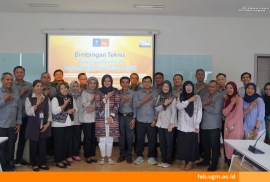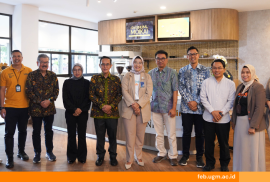Prof. Nurul Indarti, Sivilokonom., Cand.Merc., Ph.D., was officially inaugurated as a Professor of Management at the Faculty of Economics and Business, Universitas Gadjah Mada (FEB UGM) on Tuesday, August 27, 2024, at the UGM Senate Hall. With her appointment, Nurul became the first female professor of management at UGM.
The Only Female Professor at FEB
In addition to being the first woman to receive a professorship in management, Nurul is now the only female professor at FEB UGM. Previously, FEB UGM had its first female professor in Economics, Prof. Dr. Sri Adiningsih, who was inaugurated in 2013 and passed away in June 2023. She was born in Yogyakarta on August 3, 1976, and she expressed deep gratitude for her appointment as a professor. She considers the position, which she assumed on November 1, 2020, at 44, as a responsibility that must be upheld. With the highest academic authority, Nurul is committed to continuously producing knowledge through research, disseminating it through various publications and teaching, and applying it in community service activities in multiple contexts.
“Any achievement in life, including the academic title of professor, is never personal. Many parties contribute to the process, making the path easier, all by the will of Allah, the Most Merciful. Alhamdulillah, all praise to Allah,” she said on Tuesday (8/27) at the UGM Senate Hall.
Focus on Marginalized Entrepreneurs
Nurul is a lecturer and researcher at FEB UGM, focusing on entrepreneurship studies, particularly among marginalized groups such as women and people with disabilities. During her inauguration as a professor, Nurul delivered a speech titled “Viewing Entrepreneurship from the Margins: Ethnic, Women’s and Social Perspectives.” In her remarks, Nurul invited academics to view entrepreneurship through rarely used lenses: ethnic entrepreneurship, women’s entrepreneurship, and social entrepreneurship. She framed these three topics as marginal perspectives because they do not dominate mainstream discussions in the field of entrepreneurship studies.
“Ethnic, women’s, and social entrepreneurship are often marginalized due to various structural and cultural factors. They face many barriers that limit their access to the opportunities and resources enjoyed by majority groups,” she explained.
The Head of Management at FEB UGM explained that marginalized entrepreneurs, including ethnic minorities, women, people from low socio-economic backgrounds, and people with disabilities, often face biases and prejudices that can limit their opportunities. For example, women entrepreneurs may face gender bias that limits their access to business networks and mentoring opportunities. Similarly, ethnic minority entrepreneurs may face challenges integrating into mainstream markets due to cultural and language barriers, as well as discriminatory practices that limit their business opportunities.
Nurul further explained that marginalized entrepreneurship is about creating new businesses and social and economic empowerment for underrepresented groups. By understanding the challenges and barriers faced by marginalized entrepreneurs, governments can develop more inclusive strategies in the future to support and encourage their participation in the entrepreneurial ecosystem.
“The entrepreneurship literature also needs to consider the context of entrepreneurial behavior, such as the environment and culture. This shift in focus is important because studying ethnic, women, and social entrepreneurship in context helps enrich our overall understanding of entrepreneurship,” she explained, advocating for policies that are friendly to marginalized groups in entrepreneurship.
Nurul has also been developing the entrepreneurship curriculum, making it a required course for undergraduate management students in 2004. Meanwhile, she developed an entrepreneurship concentration in UGM’s Master of Management program in 2011. She is actively initiating the sustainability curriculum in the Master’s in Sustainability Development and Management (MASUDEM) program at MM FEB UGM.
Professor is Not the Goal
Nurul’s journey to becoming a professor was a laborious process. She first applied for the position in 2017 but was unsuccessful at the university level. She reapplied in 2019, and finally, in 2020, she was officially appointed to her professorship.
“Becoming a professor is not the goal, but the consequence of fulfilling the responsibilities of a lecturer well, bound by the three pillars of higher education, with the core contributing to the development of knowledge. Suppose teaching, research, and community service are done well. In that case, everything else will follow, including the title of professor,” said Nurul, who started her career as a lecturer at FEB UGM in December 1998.
Nurul mentioned that holding a professor position increases the responsibility to contribute to education, research, and community service. It does not mean that a professor must always be at the forefront, but according to her, a professor must be a role model for students and add value to the academic world.
Once Underestimated College
Nurul shared that she was a bit arrogant in her early college days. As a high school graduate with a science major, she thought studying social sciences would be easy. However, this assumption proved to be incorrect. In her first semester, Nurul’s GPA was only 2.97.
“I underestimated my studies because I came from a science background. At that time, the transcript was sent home, and my father asked, ‘What will you become if your GPA is not even 3?
In her early college years, Nurul was still actively involved in youth activities with the Muhammadiyah Student Association, which she had joined in high school. She attended SMA N 8 Yogyakarta and was active in Muhammadiyah youth activities. She even participated in activities until the early morning, neglecting her studies.
“Eventually, I stepped back from Muhammadiyah Student Association activities and started to take my studies seriously, and the results improved. The message is that we must respect knowledge and not be arrogant towards it,” she emphasized.
During her studies, Nurul was also active in various campus organizations that supported her studies and served as a teaching assistant. Nurul, who began her undergraduate studies in 1994, graduated from UGM’s Faculty of Economics in 1998 with cum laude honors. After graduation, Nurul applied to become a lecturer at FEB UGM and was accepted at her alma mater. She then continued her master’s studies at the School of Management, University of Agder, Kristiansand, Norway. She received a Master of Business Administration (Sivilokonom) in 2002 and a Master of Science in Strategic and Operations Management (Candidata Mercatoria) in 2003 from the Norwegian School of Economics and Business Administration, Bergen, Norway. In 2010, Nurul received her Ph.D. in Knowledge Management and Innovation from the Faculty of Economics and Business, University of Groningen, The Netherlands.
Reportage: Kurnia Ekaptiningrum
See the full video at https://www.youtube.com/watch?v=cH5BFsPA98w
Sustainable Development Goals (SDGs)









